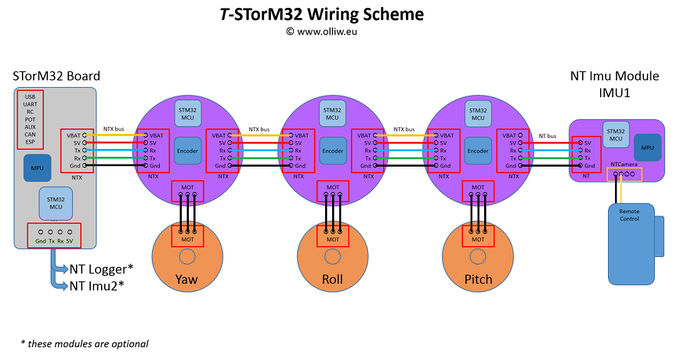Getting Started with T-STorM32: Difference between revisions
No edit summary |
|||
| Line 3: | Line 3: | ||
== Concept == | == Concept == | ||
The encoder support builds on the NT concept, and especially on the possibility of connecting | The encoder support builds on the NT concept, and especially on the possibility of connecting separate NT motor modules to the NT bus. T-STorM32 makes use of dedicated NT motor modules, which include encoders. They shall be called NT motor-encoder modules (or should we call them TNT motor modules ?). | ||
The motor drivers on the main STorM32 board cannot be used, and unlike with Basecam/Alexmos, it is also not possible to connect encoders to the main STorM32 board | The T-STorM32's concept consists of a main controller board and three NT motor-encoder modules, one for each axis. The motor drivers on the main STorM32 board cannot be used, and unlike with Basecam/Alexmos, it is also not possible to connect encoders to the main STorM32 board. The NT motor-encoder modules are connected to the NT bus, and battery power. The NTX bus has thus been introduced, which carries both the NT bus signals and the battery power lines. | ||
The concept, also sketching a typical wiring scheme, thus looks as this: | The concept, also sketching a typical wiring scheme, thus looks as this: | ||
| Line 19: | Line 19: | ||
* USB-to-serial adapter | * USB-to-serial adapter | ||
The need for the STorM32 board, the NT IMU module, and the three NT motor-encoder modules should be obvious from the concept scheme. The USB-to-serial adapter is required for upgrading the STorM32 main board to the latest firmware. It is however also extremely useful for | The need for the STorM32 board, the NT IMU module, and the three NT motor-encoder modules should be obvious from the concept scheme. The USB-to-serial adapter is required for upgrading the STorM32 main board to the latest firmware. It is however also extremely useful for employing the [[NT_Data_Logging#Live_Recording|Live Recording]] feature. | ||
== Supported Gimbals == | == Supported Gimbals == | ||
| Line 26: | Line 26: | ||
* 3-axis with camera IMU: One IMU, connected to the NT bus and mounted to the camera, and three NT motor-encoder modules are used. | * 3-axis with camera IMU: One IMU, connected to the NT bus and mounted to the camera, and three NT motor-encoder modules are used. | ||
The T-STorM32 allows connecting a 2nd IMU (IMU2). However, its data are read but not used at all. It's there only to help e.g. with vibration analyses. Connecting a 3rd IMU (IMU3) doesn't harm, but it is ignored completely, i.e. not even its data are read. | |||
== NT Motor-Encoder Module Configuration == | |||
== Basic Controller Configuration == | |||
== First Startup == | |||
Revision as of 13:02, 14 March 2017
This is a first attempt of a documentation for the T-STorM32. Will be relatively disorganized at first.
Concept
The encoder support builds on the NT concept, and especially on the possibility of connecting separate NT motor modules to the NT bus. T-STorM32 makes use of dedicated NT motor modules, which include encoders. They shall be called NT motor-encoder modules (or should we call them TNT motor modules ?).
The T-STorM32's concept consists of a main controller board and three NT motor-encoder modules, one for each axis. The motor drivers on the main STorM32 board cannot be used, and unlike with Basecam/Alexmos, it is also not possible to connect encoders to the main STorM32 board. The NT motor-encoder modules are connected to the NT bus, and battery power. The NTX bus has thus been introduced, which carries both the NT bus signals and the battery power lines.
The concept, also sketching a typical wiring scheme, thus looks as this:
Ordering Information
Things to have at minimum:
- STorM32-BGC board
- NT IMU module and matching cable
- three NT Motor-Encoder modules and matching cables
- USB-to-serial adapter
The need for the STorM32 board, the NT IMU module, and the three NT motor-encoder modules should be obvious from the concept scheme. The USB-to-serial adapter is required for upgrading the STorM32 main board to the latest firmware. It is however also extremely useful for employing the Live Recording feature.
Supported Gimbals
T-STorM32 currently supports the following setups:
- 3-axis with camera IMU: One IMU, connected to the NT bus and mounted to the camera, and three NT motor-encoder modules are used.
The T-STorM32 allows connecting a 2nd IMU (IMU2). However, its data are read but not used at all. It's there only to help e.g. with vibration analyses. Connecting a 3rd IMU (IMU3) doesn't harm, but it is ignored completely, i.e. not even its data are read.
